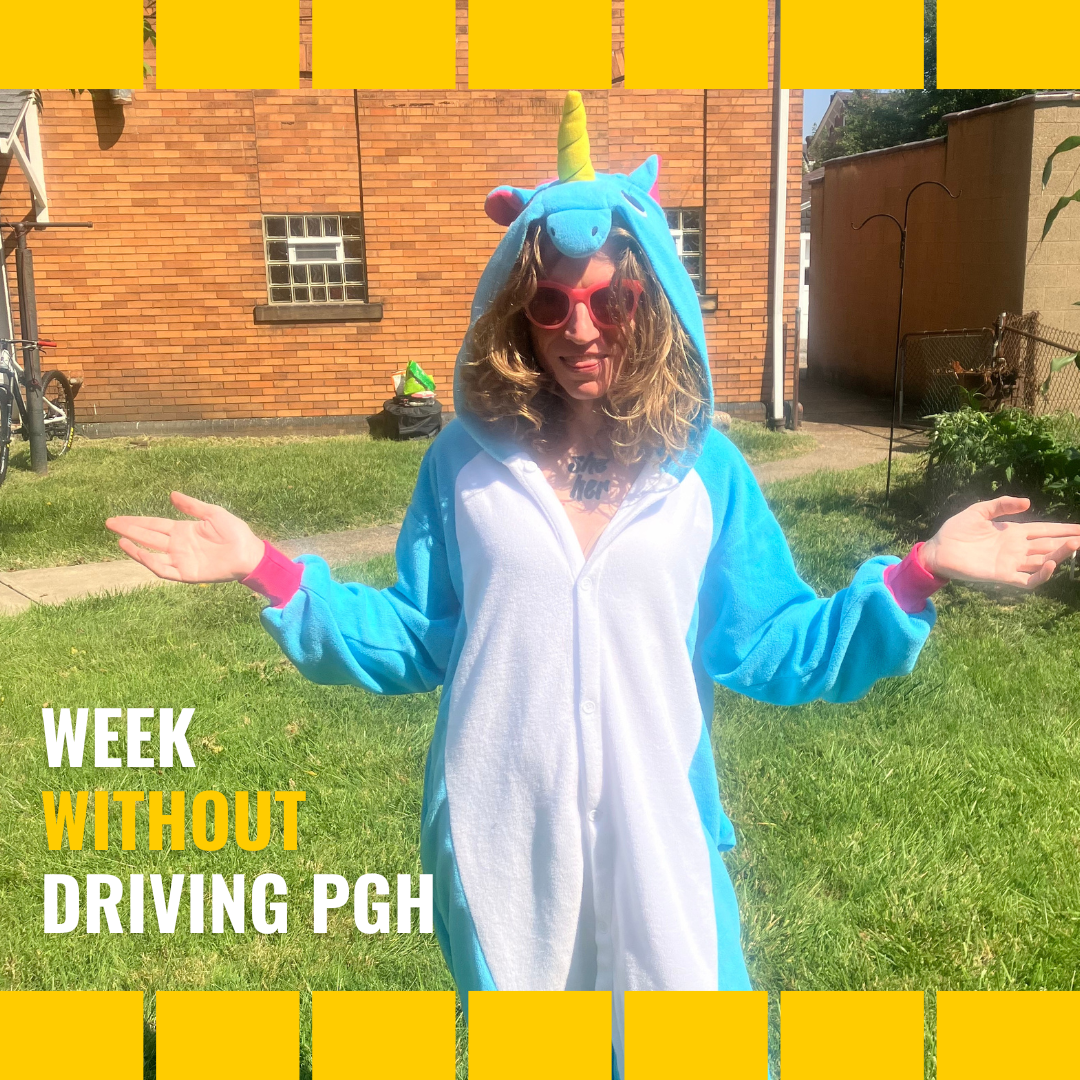
Week Without Driving PGH uplifts the stories of nondrivers and invites us all to advocate for improved mobility options. Together, we can win better access for all!
“I love the way WWD is described through a lens of equity and understanding systems. I hope people better understand what’s possible and come away with curiosity and motivation because there are so many things we can change about our built environment, public services, economy, and culture.”
Gabby McMorland
Whether we live in a suburban town or city neighborhood, everyone in Allegheny County deserves safe, reliable, dignified access to the places we need to go. I’m inviting you – whether you are an individual, organization representative, or elected official- to take the pledge to experience life as a non-driver, and participate in the national Week without Driving from Monday, Sept 30th – Sunday Oct 6th 2024!
The Week without Driving is a national week of action in which we uplift the experience of non-drivers in our communities, and highlight some of the barriers and challenges that we face getting where we need to go without being able to drive or afford a car. As youth, people with disabilities, older adults, people who cannot afford cars or gas- we non-drivers represent nearly a third of the population.
The #WeekWithoutDriving challenge was launched in 2021 by Anna Zivarts at Disability Rights Washington and is now a national initiative, led by America Walks and the National Campaign for Transit Justice. I’m proud to join this movement to raise awareness for greater mobility needs in every community, and I’m a member of Access Mob, a Disability Justice organization which is one of the four co-hosts for Week Without Driving PGH.
My name is Gabby McMorland and I invite you to join me for the Week Without Driving PGH to advocate for improved mobility for all!
I’m Gabby McMorland and I’m a blind/Disabled transwoman living in Bloomfield, which has a lot of access to transit, food retail, and entertainment but is also one of Pittsburgh’s increasingly more expensive rental neighborhoods. I started losing my vision over twenty years ago when i was nineteen. I still have some vision, but I’m seeing the world in scrambled fragments through a fractured kaleidoscope of my peripheral vision.
I travel by bus, walking with my white cane, or using for-profit ride service apps. Paying for rides like this is not affordable for many Disabled people and multiple companies are also being sued for not having wheelchair-accessible vehicles. I often use GPS on my phone to navigate while walking because I cannot read signs, but I also rely a lot on asking strangers for directions or inquiring about practical matters like whether I’m at a bus stop or where to find a bathroom. Yes, this means that I’m a transwoman who must routinely discuss my bathroom selection with strangers.
I only see sighted pedestrians at the last minute when they suddenly pop into my peripheral vision or wordlessly crunch through fallen leaves next to me at night. Many sighted people freeze in place and remain silent even if I notice them and say hello. I occasionally have bizarre encounters where sighted people insist I’m faking being blind and confront me about it, which is terrifying in the moment. I often overhear people saying to their friends, “oh they’re not really blind”. Strangers physically grab my body and tell me they’re going to help me across the street or, more alarmingly, down the street.
I’m blind and also cannot ride a bike. Also, before I started losing my vision, I totaled my dad’s used Honda Civic and happily returned to riding a bike. I was living proof that our system involves handing out driver’s licenses to totally unqualified people because our society values the car as a symbol of freedom, virility, and maturity more than life itself. we’re addicted to convenience and I expect to see our various wars for oil soon transition into lithium wars as hybrids grow in popularity. I don’t want a personal robot on a monthly subscription, I want visionary mass transit, human centered street design, and universal access to mental health care.
I love the way WWD is described through a lens of equity and understanding systems. I hope people better understand what’s possible and come away with curiosity and motivation because there are so many things we can change about our built environment, public services, economy, and culture. I don’t want people to think of this as a character building challenge or even some kind of virtuous path towards empathy. I’m thinking of how well-intentioned people sometimes engage in those disability immersion experiences with blindfolds or using a wheelchair for an afternoon and their main takeaway is that it’s hard. It’s true, I personally find my physical impairment to be logistically difficult and sometimes deeply upsetting, but I don’t want anyone’s patronizing pity – I want people to find solutions beyond my body. I mean, lots of things are difficult when you try them for the first time, like stilt walking or playing the violin. I’m pretty good at getting around, let’s work together to level up this world around us!
- Gabby McMorland